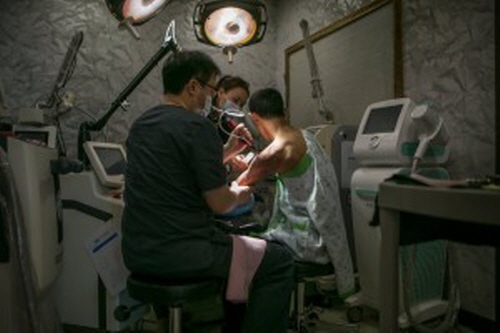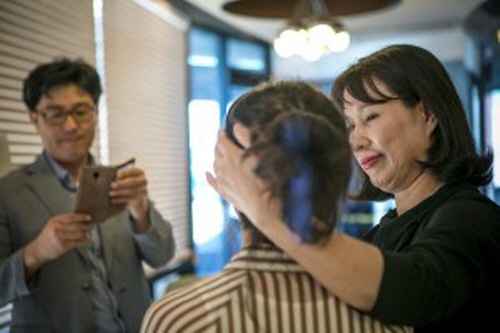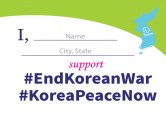미 뉴욕타임스(NYT),탈북자 “성형수술통일 후 사회문제 대비 위한 실험” 보도
-
– 탈북자 대상 성형수술 시행 서울발로 상세 보도
– ‘성형공화국’ 한국에서 성형수술의 순기능 가능성 시사
대한민국은 성형공화국으로 불릴 정도로 성형 수술이 일반화돼 있다. 주로 취업이나 진학 목적으로 성형이 행해지는데, 외모 지상주의가 판치는 한국 사회의 단면 중 하나다.그런데 미국 뉴욕타임스(NYT)는 이 성형수술이 경우에 따라선 긍정적인 영향을 미칠 수 있음을 지적하고 나섰다.
NYT는 24일 서울발 기사를 통해 성형외과 전문의들의 지원을 받아 탈북자들에게 성형수술 기회를 주고 있다는 사실을 전했다.탈북 전, 당한 사고 흉터 혹은 지도자에게 충성맹세를 하기 위해 새긴 문신 등은 탈북자들이 한국 사회에 정착하기 어려운 장애물이었다.
이들이 성형수술 지원으로 새로운 삶을 찾은 것이다. NYT는 이 사실을 전하면서 “탈북자 정착을 위한 정부 차원의 지원은 남북 통일됐을 때 불거질 수 있는 사회 문제에 대처하기 위한 실험이 될 수 있다”고 지적했다.
탈북자에 대한 성형수술 시술은 탈북자에 관대하지 않은 우리 사회가 베푸는 얼마 되지 않는 순기능 가운데 하나일 것이다.다음은 뉴스프로가 번역한 뉴욕타임스 기사 전문이다.
번역 감수: 임옥
기사 바로가기 ☞ http://nyti.ms/1KxV7BR
South Korean Plastic Surgeons Help Northern Defectors Erase Their Scars
한국 성형외과 의사들, 탈북자들의 상처를 치유해줘
By CHOE SANG-HUN
OCT. 24, 2015

Dr. Hong Jeong-geun uses a laser to remove a tattoo from the arm of a North Korean defector at a clinic in Seoul, South Korea. CreditJean Chung for The New York Times
홍정근 박사가 한국 서울의 한 병원에서 레이저를 이용해 탈북자의 팔에 새겨진 문신을 지우고 있다.SEOUL, South Korea — Nearly 20 years ago, Lee Geung-ja was working the night shift at a factory in North Korea when an accident with melting plastic left her face scarred and discolored. Most of her left eyebrow and eyelid were destroyed. In her own words, she looked like “a monster.”
한국 서울 – 거의 20년 전 이긍자 씨가 북한의 한 공장에서 야간교대조로 근무하던 당시 불에 녹은 플라스틱 사고로 그녀의 얼굴은 흉터가 지고 변색이 됐다. 왼쪽 눈썹과 눈꺼풀 대부분이 없어졌다. 그녀 자신의 말로 그녀는 “괴물”처럼 보였다.
In 2010, she defected to South Korea, where she lived like a creature of the night, working alone cleaning buildings and bathhouses in the wee hours to avoid being stared at. Her self-consciousness wasn’t helped by the fact that South Korean society places a huge importance on appearance, particularly for women: Plastic surgery is a common gift for daughters after high school or for college graduates hunting for jobs.
2010년 그녀는 남한으로 망명해서 남들의 시선을 피하고자 꼭두새벽에 홀로 건물과 화장실을 청소하며 야행성 동물처럼 살아왔다. 그녀의 자의식은 한국 사회가 외모, 특히 여성의 외모에 큰 비중을 둔다는 사실 때문에 더욱 나빠졌다. 한국 사회에서 고등학교 졸업 후나 취업 준비 중인 대학 졸업생 딸들에게 성형수술은 흔한 선물이다.
“When I walk on the street or have to meet another person, I instinctively lower my face and turn to the left not to show its left side,” Ms. Lee, 40, said in an interview. “In South Korea, where even good-looking people go under the knife, I find it harder to compete with this face.”
“길을 걷거나 누구를 만나야 할 때, 나는 본능적으로 고개를 숙이고 얼굴 왼쪽을 감추려고 왼쪽으로 고개를 돌린다”고 이(40세) 씨가 인터뷰에서 말했다. “외모가 출중한 사람들조차도 수술대에 오르는 한국에서 이런 얼굴을 가지고는 경쟁하기 어렵다”고 그녀는 덧붙였다.
Now Ms. Lee is getting help she never dreamed of: A plastic surgeon has volunteered to help her regain some of her old looks — and self-esteem.
그런 그녀가 이제 꿈도 못 꾸던 도움을 받게 되었다: 한 성형외과의사가 무료로 그녀의 예전 모습, 그리고 자신감을 조금이나마 찾아주겠다고 나선 것이다.
It is part of a program started this year by the police and volunteers from the Korean Association of Plastic Surgeons to help defectors from North Korea who are literally scarred by their past.
이것은 올해 경찰과 한국성형외과의사회의 자원봉사자들이 문자 그대로 탈북자들이 가진 과거의 상처를 치유해주기 위해 시작한 프로그램의 일환이다.
Since news of the free surgery program spread, dozens of defectors have signed up, including a man who cannot breathe through his nose after it was smashed in a logging camp accident. One woman who had lost a breast to cancer hoped reconstructive surgery would make her more comfortable using a public bathhouse and dating again.
무료 수술프로그램에 대한 소문이 퍼지자, 벌목장에서의 사고로 코가 으스러진 후로는 코로 숨을 쉴 수 없던 한 남성을 포함해 수십 명의 탈북자들이 이에 등록했다. 암으로 한쪽 가슴을 잃은 한 여성은 복원 수술을 받으면 더 편안하게 대중목욕탕을 이용하고 다시 데이트를 할 수 있을 것이라 희망했다.
Many of the 28,000 defectors living in the South carry burdens that make it harder for them to resettle in a capitalist society. They are often paid less and are treated as untrained and emotionally unstable workers.
한국에 살고 있는 28,000명 이상의 탈북자들 다수가 자본주의 사회에서 재정착하는 것을 더 힘들게 만드는 고통을 지니고 있다. 그들은 종종 임금도 덜 받으며, 숙련되지 않고 감정적으로 불안정한 노동자로 취급된다.
They are also haunted by memories of relatives who starved to death or were banished to prison camps, and by fears for those they left behind in the North. Those same fears compel many, including those interviewed for this article, to adopt pseudonyms in the South to protect their North Korean relatives.
그들은 또한 굶어 죽었거나 수용소로 추방된 친척들에 대한 기억, 그리고 북에 남기고 온 사람들에 대한 걱정으로 괴로워한다. 그러한 비슷한 두려움 때문에 이 기사에 인터뷰한 사람들을 포함해서 많은 사람들이 북한의 친척들을 보호하기 위해 한국에서 어쩔 수 없이 가명을 사용한다.
Kim Kyeong-suk, a superintendent at the Yongsan police station in Seoul who helps link defectors to plastic surgeons, came up with the idea for the program after hearing many people from the North say they could not find work because of their scars.
탈북자들을 성형외과의사와 연결해주는 일을 돕고 있는 서울 용산경찰서 경감인 김경숙 씨는 많은 탈북자들로부터 상처 때문에 직장을 구할 수 없다는 말을 듣고 이 프로그램의 아이디어를 생각해냈다.
“Surprisingly often, you find defectors carrying big ugly scars, like crude stitches crawling like giant centipedes on their stomach, patches of hair missing from their scalp and other signs of torture, or they wear ideological slogans tattooed on their skin,” she said.
“놀랄 만큼 흔히 탈북자들은, 큰 지네가 기어가는 듯한 모습의 엉성한 복부의 바늘 자국들, 두피 부분 탈모 부위, 그리고 그 외 다른 고문의 흔적들과 같은 크고 추한 흉터를 지니고 있거나 혹은 이념적인 구호를 피부에 문신으로 새긴 것을 본다”고 그녀는 말했다.
For Lee Cheon-seong, a tattoo was all it took to seal his transformation from patriot to pariah.
이천성 씨의 경우, 문신은 그를 애국자에서 깡패로 탈바꿈시키기에 충분했다.

Kim Kyeong-suk, a police superintendent in Seoul, poses with a defector from North Korea after a free treatment for burns. Credit Jean Chung for The New York Times
서울시 김경숙 경감이 무료 화상 치료를 받은 탈북자와 함께 포즈를 취하고 있다.In 1986, he and several comrades in their North Korean military unit tattooed themselves with vows of loyalty to Kim Il-sung, the North’s founding president and grandfather of its current leader, Kim Jong-un.
1986년 그와 북한 군부대의 몇몇 동지들은 북한의 건립 대통령이자 현 지도자 김정은의 할아버지인 김일성에 대한 충성의 맹세를 몸에 문신으로 직접 새겼다.
The North Korean authorities permitted soldiers to have tattoos as long as they contained political pledges to defend the fatherland, included vows to be “guns and bombs” for the leader, or swore hatred of the United States.
북한 당국은 지도자를 위해 “총과 폭탄”이 되겠다는 맹세 혹은 미국에 대한 증오심을 서약하는 것을 포함해 조국을 수호하는 정치적 서약을 담고 있는 문신에 한해 군인들에게 이를 허용했다.
It was not until Mr. Lee fled a political purge and defected to South Korea last year that he learned that many South Koreans associated tattoos with organized crime.
그는 지난해 정치적 숙청으로 도망쳐 남한으로 망명하고 나서야 많은 한국인들이 문신을 범죄 조직에 결부 짓는다는 사실을 깨달았다.
“The tattoo always became an issue during job interviews and blocked me from getting hired,” Mr. Lee, 45, said. “Besides, it is such a constant reminder of how I was betrayed by the regime I had once worshiped that I feel like cutting it out with a razor blade.”
이(45세) 씨는 “문신이 일자리 면접 시에 항상 문제가 됐고 일자리를 잡는 데 방해가 됐다”고 말했다. “게다가 그것은 한때는 내가 충성을 다 바친 당이 나를 어떻게 배신을 했는지를 끊임없이 상기시키는 것이어서 면도날로 도려내고 싶을 지경이었다.”
Dr. Hong Jeong-geun, a board director at the Korean Association of Plastic Surgeons who is removing Mr. Lee’s tattoos on his left arm, said plastic surgeons volunteered to help defectors in part to help their own public image. Through the program, a dozen doctors have met with defectors so far.
이 씨의 왼쪽 팔 문신을 제거하고 있는 한국 성형외과의사회 이사 홍정근 박사는 탈북자들이 스스로에 대해 가진 대외적인 이미지를 돕자는 이유 등에서 성형외과의사들이 탈북자들을 돕는 일에 자원했다고 말했다. 이 프로그램을 통해 지금까지 열두 명의 의사들이 탈북자들을 만났다.
Seoul is a magnet for those seeking plastic surgery. There are hundreds of clinics offering cosmetic surgery counselors to suggest procedures and advise patients as well as translators for Chinese women who travel for their services. Before and after posters of patients adorn the subways.
서울은 성형수술을 찾는 사람들에게 있어 자석과도 같은 곳이다. 수백 개의 성형외과들이 절차를 설명하고 환자들에게 조언을 해주기 위한 성형 수술 상담 전문가와 더불어 성형 수술을 받기 위해 온 중국 여성들을 위한 통역을 갖추고 있다. 성형 전후의 환자 모습을 보여주는 포스터들이 지하철을 장식한다.
Detractors say the practice has gone too far, helping perpetuate the idea that a narrow standard of beauty yields good jobs and successful spouses.
성형수술을 비방하는 사람들은 성형을 위한 시술이 도를 넘어섰다며 협소한 기준의 아름다움이 좋은 직장과 성공한 배우자를 얻게 한다는 생각이 지속되도록 일조한다고 말한다.
“When our children ask what our profession is, many of us will no longer feel proud to tell them,” Dr. Hong, who runs Metro Plastic Surgery in Seoul, said. He has helped three defectors.
“자식들이 우리의 직업이 뭐냐고 물어볼 때, 우리 중 많은 이들이 더는 자랑스럽게 이를 말할 수 없을 것이다”고 서울에서 메트로 성형외과를 운영하는 홍 박사가 말했다. 그는 탈북자 세 명에게 성형수술을 해줬다.
For South Korean officials, helping defectors adjust to life here could be an experiment in managing possible societal problems if the two Koreas were to reunite. As part of those efforts, the government provides free apartments to defectors and subsidizes their education and job training.
한국 정부 관계자들에게 있어서, 탈북자들이 이곳 생활에 적응하도록 돕는 일은, 남북한이 통일됐을 때 있을 수 있는 사회적 문제에 대처하기 위한 실험이 될 수도 있다. 탈북자들을 돕는 노력의 일환으로, 정부는 그들에게 아파트를 무상으로 제공하고 교육과 직업 훈련을 보조한다.
According to a government survey taken last year, defectors believe their economic status in the capitalist South is lower than it was in the North’s supposedly classless society.
지난해 실시한 정부 설문조사에 의하면, 탈북자들은 자본주의 사회인 남한에서의 자신들의 경제적 지위가 무계급 사회라고 알려진 북한에서보다 낮다고 여긴다.
Defectors earned 66 percent of an average South Korean’s wages, the survey showed. Their unemployment rate was four times the national average, and suicide was three times as common among defectors.
설문 조사에서 탈북자들은 남한 사람들 평균 임금의 66%를 버는 것으로 나타났다. 탈북자들의 실업률은 국민 평균의 4배에 달했으며 자살률은 탈북자들 사이에서 3배나 흔했다.
“I often thought of killing myself and my 5-year-old son to end my misery,” said Kim Seon-ah, 37, who wants to erase cigarette burn marks on her head and chest that were inflicted by a Chinese man, the father of her son. She said he had bought her from human traffickers after she fled the North for China in 2003.
“나는 종종 이 비참함을 끝내기 위해 5살 아들과 함께 자살할 것을 생각하곤 했다”며 아들의 아버지인 중국인 남성이 자신의 머리와 가슴에 낸 담배로 지진 자국들을 지우고 싶어하는 김선아(37) 씨는 말했다. 그녀는 자신이 2003년 중국으로 탈출한 후 그 사람이 인신매매범들로부터 자신을 샀다고 말했다.
“I still have a phobia for men,” she said.
“나는 아직도 남자들에 대한 공포가 있다”고 김 씨는 말했다.
Ms. Lee, the factory worker, said that after her accident she had no access to medicine other than to use saline solution on her wounds.
공장 노동자인 이 씨는 사고 후 상처 부위에 식염수를 사용하는 것 말고는 다른 약을 구할 수 없었다고 말했다.
She fled North Korea in 1998 at the height of a catastrophic famine, entering China as an illegal migrant. She was sent home three times, but each time she fled back to China, where she met a man and gave birth to a boy.
이 씨는 1998년 대기근이 기승을 부릴 때, 북한을 탈출해 밀입국자로 중국에 건너갔다. 그녀는 세 번 추방되었지만 매번 다시 중국으로 다시 도망갔고 그곳에서 그녀는 한 남자를 만나 아들을 출산했다.
After finally making it to South Korea, Ms. Lee was fascinated by a reality television show that featured drastic makeovers through plastic surgery.
마침내 한국으로 들어온 후 이 씨는 성형수술을 통한 극적인 외모 변신을 보여주는 리얼리티 TV 쇼에 매료됐다.
“Just watching it gave me comfort,” said Ms. Lee, who lives in Gimpo, west of Seoul.
“그 프로를 시청하는 것만으로도 위안이 됐다”고 서울 서쪽 김포에 사는 이 씨는 말했다.
Recently, Ms. Lee made her first visit to Dr. Park Sang-hyeon at Semi Beauty and Plastic Surgery in Seoul. The doctor told her she will need multiple surgeries over many months to regain some of her looks. Despite the arduous path ahead, she has developed a modest dream: attending a parents’ meeting at her third-grade son’s school for the first time.
최근 이 씨는 서울에 있는 새미 뷰티 앤 성형수술 병원의 박상현 박사를 처음 방문했다. 박 박사는 그녀의 원래의 외모를 다소라도 찾기 위해서는 몇 달에 걸쳐 여러 차례 성형수술을 해야 한다고 말했다. 험난한 길이 앞에 놓여 있음에도 불구하고 그녀는 3학년에 재학 중인 아들의 학교 학부모 회의에 처음으로 참석할 수 있다는 소박한 꿈을 가지게 됐다.
“My biggest fear has been that my son would be ashamed of me when his classmates see my face,” she said.
“내 가장 큰 두려움은 반 아이들이 내 얼굴을 볼 때 내 아들이 나를 수치스러워 하는 것”이라고 그녀는 말했다.
순천구례곡성담양인터넷 뉴스 구독신청
기사제보/광고문의/취재요청(061)741-3456

















